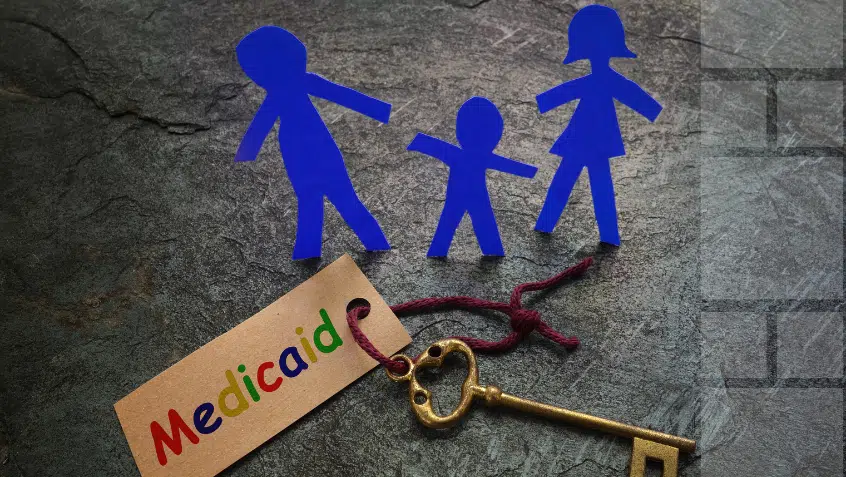Join Us Live for a Discussion on Medicare, Democracy, and the Future of Health Care
House Republicans Move Forward with Plans to Cut Medicaid and Food Stamps, Reducing Coverage for Millions

On Tuesday, three House committees moved forward with agendas that would make it harder for older adults, people with disabilities, children, and working families to meet their basic needs like food and health care. Taken together, these agendas would cut benefits for low-income families while cutting taxes for those with higher incomes. In total, as many as 14 million people could have their coverage terminated, with nearly 4 million losing food assistance.
Cuts to Medicaid
The House Energy and Commerce Committee, the committee with jurisdiction over Medicaid, has approved massive cuts to Medicaid that the Congressional Budget Office (CBO) projects will lead to 10.3 million people losing Medicaid coverage and 7.6 to 8.6 million people going uninsured. Among those losing coverage would be millions of people dually eligible for Medicare who rely on Medicaid for benefits and help paying Medicare costs.
The Medicaid changes include adding burdensome work reporting requirements on some populations and requiring them to demonstrate they are working before they can access any care. We know from past research and experimentation that if the goal is to help people find employment, work reporting requirements do not work. They merely terminate coverage for people who need it.
… if the goal is to help people find employment, work reporting requirements do not work. They merely terminate coverage for people who need it.
These new requirements would be in addition to adding new costs for care; cutting access to retroactive coverage that is a lifeline for people who fall through the cracks because they do not know they are eligible or are unable to apply for help; and getting rid of a pair of regulations that made it easier for people to get and stay enrolled in Medicaid and Medicare Savings Programs—increasing Medicaid churn through administrative burdens and paperwork.
The text also finalized a proposed rule that would harm access, affordability, and coverage of Marketplace plans.
Cuts to SNAP
The House Committee on Agriculture has approved a massive cut to the Supplemental Nutrition Assistance Program (SNAP), also known as “food stamps.” These cuts include changes that shift costs to states; add new work reporting requirements for people between 55 and 64 years old; add new work reporting requirements for parents of school-age children (with no children 6 years old or younger); bar states from seeking waivers on the work requirements due to lack of work in an area; and prevent future administrations from increasing food benefits to respond to emergencies like COVID-19 or recessions.
Previous CBO estimates on the work and waiver proposals projected that 3 to 3.5 million people would lose all access to SNAP benefits…
Previous Congressional Budget Office (CBO) estimates on the work and waiver proposals projected that 3 to 3.5 million people would lose all access to SNAP benefits, with 100,000 to 150,000 losing some of their benefits. Experts predict that the cuts plus the proposed shifting of costs to states will stress state budgets, economies, and farmers, and lead to further benefit cuts. Importantly, SNAP work requirements have not helped people find work; instead, they are simply driven out of the program.
Marketplace Plan Enrollees Lose Enhanced Premium Tax Credits
The House Committee on Ways & Means, the committee of jurisdiction for taxes, has approved a suite of tax policies that does not include an extension of enhanced premium tax credits that currently help people pay for health insurance through an Affordable Care Act (ACA) Marketplace plan. The CBO has projected that failure to extend these credits will lead to millions of people becoming uninsured on top of the Medicaid numbers.
What’s Next
The full House must still vote on these policies, and the margins are very tight, so there is no guarantee House Republicans have the votes to pass the full reconciliation bill. If the House does pass it, the Senate would then take it up. Experts predict the Senate would have to make some changes to the bill in order to pass that chamber, but any changes may upset some numbers of House Republicans. Ultimately, both chambers must pass identical text to make the bill into law.
A Cut to Medicaid is a Cut to Medicare
At Medicare Rights, we know that our entire health system is intertwined and a cut to Medicaid is a cut to Medicare. Marketplace and SNAP coverage are also vital for people’s well-being and financial stability.
For these reasons, we strongly oppose terminating Medicaid and SNAP coverage—including through increased red tape and work requirements—or reducing assistance for Marketplace consumers. The health consequences of losing access to high-quality, affordable health care and food cannot be overstated. We call upon all policymakers to make it easier for people to meet their basic needs, not harder.
Tell Congress to Say NO to These Cuts
Make your voice heard by sending Congress a clear message: Don’t cut these essential programs! Learn more and take action today.
Show Comments
We welcome thoughtful, respectful discussion on our website. To maintain a safe and constructive environment, comments that include profanity or violent, threatening language will be hidden. We may ban commentors who repeatedly cross these guidelines.
Help Us Protect & Strengthen Medicare
Donate today and make a lasting impact
More than 67 million people rely on Medicare—but many still face barriers to the care they need. With your support, we provide free, unbiased help to people navigating Medicare and work across the country with federal and state advocates to protect Medicare’s future and address the needs of those it serves.
The Latest
Most Read
Add Medicare to Your Inbox
Sign up to receive Medicare news, policy developments, and other useful updates from the Medicare Rights.
View this profile on InstagramMedicare Rights Center (@medicarerights) • Instagram photos and videos









